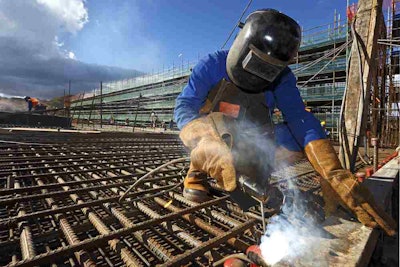
The technical advancements in fracking and horizontal drilling have opened up a bonanza of new petrochemical resources in the United States. This is why the energy companies are doing so well, why you’re paying 50 cents less for a gallon gas this year, why emissions of greenhouse gasses are going down, and one of the reasons why the economy is moving out of recession.
But if we want to continue to enjoy the economic fruits of this technology we should be asking what might derail or slow it down. Some might think the EPA, but I doubt it. The environmental advantages of natural gas fuels are too attractive.
I can only think of one problem that could stunt the growth of these new businesses and that would be the lack of skilled technicians and construction workers. What if we can’t find enough people to work in the oil fields and the pipeline industries? Does that put a top end limit or how fast we can develop these resources…and have we already reached that limit?
I think so. I recently attended the Association of Equipment Management Professional’s Annual Symposium and there I was told by more than one construction fleet manager that 50 percent of the people who apply for jobs with them can’t pass the drug test.
The Federal Bureau of Labor Statistics says there are more than 600,000 vacancies in jobs requiring vocational and technical skills. Our country spends $300 billion a year on four-year colleges and universities, but a pathetic $40 million on apprenticeship programs. Yet half the kids who start out in a four year college or university don’t finish, and half of those who do don’t work in jobs that require the degrees for which they and the taxpayers paid so dear.
The average Joe who has no connection with construction or manufacturing may look around and think we don’t have a problem. But we do. Just look at the industrial disasters we’ve experienced in the last few years:
- The Deepwater Horizon offshore oil well exploding in the Gulf of Mexico, killing 17 people and creating the biggest oil spill in the history of the country.
- A fertilizer plant in Texas blows up killing 14 people and wiping out 70 homes.
- In Birmingham, Alabama a flight schedule sign in the newly refurbished airport collapses, killing a young boy and severely injuring his mother.
- An engine fire cripples a Carnival cruise ship setting hundreds of passengers adrift in the Gulf of Mexico for days.
- A barge in Mobile Bay explodes in May sending three workers to the hospital in critical condition.
- The Pegasus oil pipeline ruptures in Arkansas March 29 and again May 2 in Missouri, spewing millions of gallons of toxic crude oil over suburban lawns and homes.
In each of these cases the cause of the problem can be attributed to one of three things or a combination of the three:
- Defective design or engineering
- Poor installation or construction
- Inadequate monitoring and maintenance.
Few of these disasters can be blamed on the engineers who designed the equipment or systems. That stuff gets pretty well vetted before it’s built.
It looks like to me we’re entering a new phase of the industrial revolution where shoddy installation and poor maintenance are becoming routine—with disastrous results. This can be traced directly back to our country’s refusal to properly educate our blue collar workforce.
The average skilled construction worker or mechanic in this country is well into his 50s. He is not being replaced in sufficient numbers with younger workers who have the skills or the work ethic to do things right. And it shows.
If you think I’m exaggerating, just watch the news. When when you see yet another of these industrial disasters ask yourself if it was caused by poor design, construction or maintenance. It has to be one of the three and probably one of the later two–the deadly legacy of our misguided educational priorities.
In the last 100 years we created a fun, fascinating, high-tech, industrial world for ourselves that has brought wealth and ease for many. And now we’ve abandoned it’s care and maintenance to the least capable and least educated among us. This isn’t an accident, it’s a choice.










